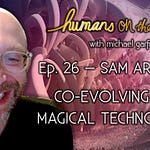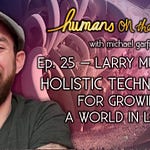This week’s episode is an experiment in science fiction storytelling – the author-read short story “An Oral History of The End of ‘Reality.’” Originally released to Patreon supporters (without the intro or musical soundtrack) last November, this story brings together many of the core themes of Future Fossils: the challenges of navigating overwhelming and contradictory information online; the new literacies that will emerge in response to AI-assisted “deep fakes” that make conventional evidence inadmissible in courts or scientific journals; the thinning veil between our physical senses and the ethereal realm of data; and the experience of time in a future when possibility, prediction, and recording stretch out in all directions (but unreliably).
My first adult foray into the world of science fiction, this piece was inspired – nay, made necessary – by the recent news about new vocal synthesis AI that lets consumers edit audio and video and manufacture wholly new, convincing forgeries that sound and look exactly like "the real thing."
We all grew up in an age when our recordings are the evidence of something. It was certainly a step up from the hearsay that we once relied on, but it's not enough these days – and as technology gets more and more sophisticated it may be impossible for us to tell the difference between "what's really there" and what is just a digital illusion.
Trip with me down this vertigo-inducing psychedelic tunnel to a world in which invisible and discarnate agents speak to you in lovers' voices; in which algorithmic AI pop stars outcompete real artists and our thoroughly-mapped world returns to demon-haunted wilderness; in which we all become half-monks and half-forensics-experts as the new obsession is attempting to determine if we can believe our senses...
This piece is planned as the epilogue to my forthcoming book, How To Live in The Future. It's a rare weird bird among its influences: one part literature, one part psychedelic beat screed, and the first time I have managed to combine the metanoia, vision, and poetic flourish that inspires me to write.
(I also wrote it all by hand in a delicious Clairefontaine "Flying Spirit" journal that I bought in Montréal this summer, and took with me to the Global Eclipse Gathering and Burning Man. I have to say, that had no small effect on how this all came out. Real pen and paper leads to very different writing.)
If you’d like the PDFs of the original handwritten manuscript, you can find them here:
https://evolution.bandcamp.com/album/an-oral-history-of-the-end-of-reality
Read all of my publicly-available draft chapters of How to Live in the Future, the companion essays to this story:
https://medium.com/@michaelgarfield
All of the music in this episode is from my album, Love Scenes & Field Recordings, which you can download for any price here:
https://michaelgarfield.bandcamp.com/album/love-scenes-field-recordings
Cover Image © Giacomo Carmagnola and reused with permission.
Check out his work and help him support his aging mother:
https://facebook.com/giacomocarmagnolaart
Special thanks to Transhumanity.net for being a featured sponsor of this podcast! Their concerns about the ethical deployment of artificial general intelligence (AGI) are perfectly aligned with this episode’s rather chilling speculative futures, and I’m glad to know that there are people working on a world where AGI improves the lives of every person, not just the very rich.
Support this show on Patreon:
https://patreon.com/michaelgarfield
Join the Facebook Group:
https://facebook.com/groups/futurefossils
Subscribe on Apple Podcasts:
https://itunes.apple.com/us/podcast/future-fossils/id1152767505?mt=2
Subscribe on Google Podcasts:
http://bit.ly/future-fossils-google
Subscribe on Stitcher:
https://www.stitcher.com/podcast/michael-garfield/future-fossils
Subscribe on Spotify:
https://open.spotify.com/show/2eCYA4ISHLUWbEFOXJ8C5v
Subscribe on iHeart Radio:
https://www.iheart.com/podcast/269-FUTURE-FOSSILS-28991847/
Support this show http://supporter.acast.com/futurefossils.
Hosted on Acast. See acast.com/privacy for more information.










